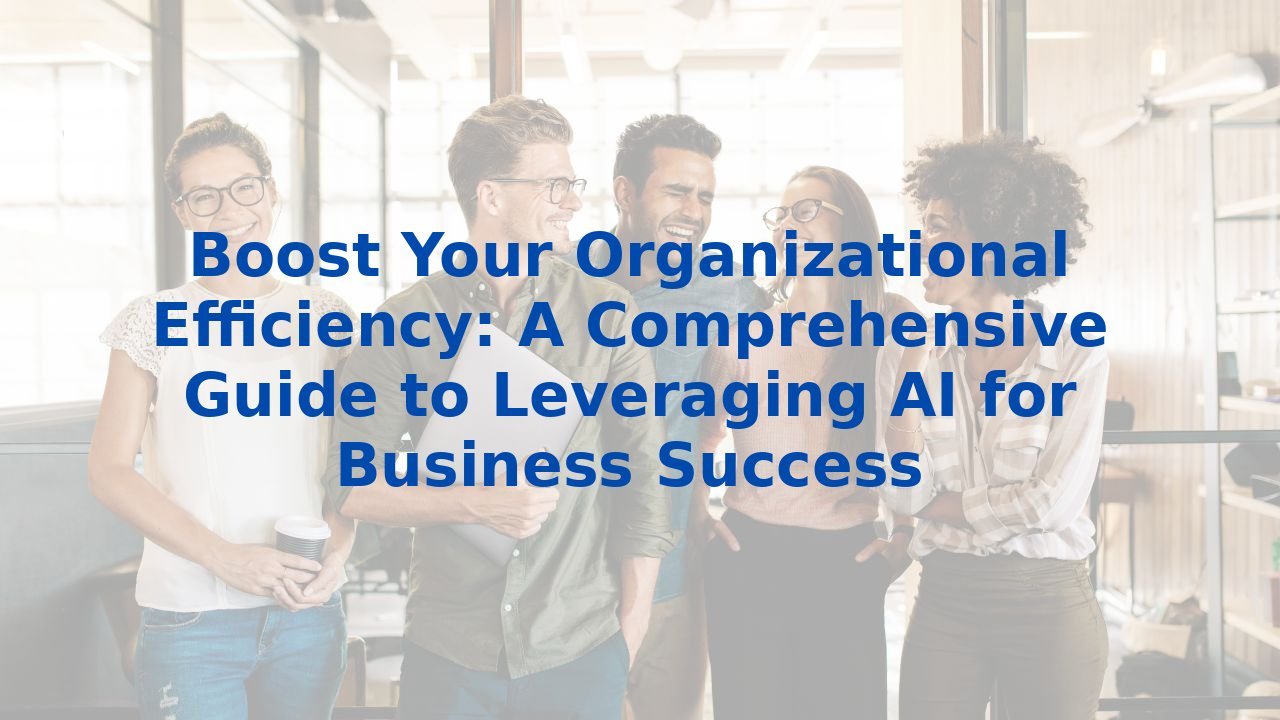Boost Your Organizational Efficiency: A Comprehensive Guide to Leveraging AI for Business Success
Boost Your Organizational Efficiency: A Comprehensive Guide to Leveraging AI for Business Success
Introduction
In the relentless tide of today's business landscape, organizations are not just aiming to survive; they strive to thrive. Artificial Intelligence (AI) emerges as a revolutionary force with the potential to redefine efficiency and enhance performance across various business functions. In this guide, we will explore how AI can significantly transform general business processes and why investing in employee training is crucial in this journey toward greater operational success.
Enhancing Efficiency in Business Processes
AI’s impact across key areas of business operations is profound and undeniable. Here are some essential processes that AI can redefine:
- Process Automation: By automating mundane and repetitive tasks, AI liberates human resources, enabling them to engage in strategic endeavors. The reduction of human error alongside increased operational speed empowers organizations to remain agile and responsive in an ever-changing environment.
- Data Analysis: The capacity of AI to analyze vast datasets in real-time transforms how organizations derive insights. This capability allows for rapid decision-making grounded in data, fostering a culture of informed choices.
- Predictive Analysis: With AI's predictive capabilities, organizations can anticipate trends, customer behaviors, and market dynamics. This foresight in resource allocation and strategic planning is a game-changer, allowing businesses to navigate challenges before they arise.
- Customer Interaction: AI-driven tools, such as chatbots, personalize customer relations, enhancing engagement and loyalty. Tailored interactions not only elevate customer satisfaction but also drive revenue growth.
Benefits of AI for Organizational Efficiency
Integrating AI into organizational workflows unlocks a myriad of benefits that amplify overall efficiency:
- Enhanced Speed and Accuracy: AI operates at speeds and levels of precision that far surpass conventional methods. By streamlining operations, organizations can not only increase output but also minimize errors.
- Improved Resource Allocation: With robust data analysis capabilities, AI enables organizations to ascertain how to best utilize their resources, resulting in optimized operational strategies.
- Real-Time Data Analysis: The ability to analyze and interpret data in real-time ensures organizations are not just reacting but proactively shaping their business strategies in the face of emerging trends.
- Cost Reduction and Resource Optimization: Through automation and operational enhancements, AI fosters significant cost savings by minimizing waste and maximizing resource efficiency, paving the way for sustainable growth.
The Role of Employee Training in AI Integration
While AI presents groundbreaking opportunities for enhancing organizational efficiency, the journey does not stop at implementation. The human element remains critical in this evolution. Here’s how employee training plays an essential role:
- Upskilling and Reskilling: Organizations must commit to upskilling their workforce, ensuring that employees possess the necessary skills to utilize AI effectively. This training can cover crucial areas such as data analytics and machine learning, empowering employees to work alongside these transformative technologies.
- Adaptability and Innovation: Cultivating a culture that champions continuous learning fosters adaptability among employees. As industries evolve, this mindset is vital for leveraging AI efficiently and remaining competitive in a fast-paced environment.
- Ethical Guidelines: Establishing ethical frameworks for AI usage is imperative. These frameworks can help address potential algorithmic biases and uphold data privacy, promoting transparent decision-making and mitigating reputational risks.
Conclusion
AI is not merely a technological advancement; it is a strategic imperative for today’s organizations striving for success. The transformational capabilities of AI—from process automation to predictive analytics—unquestionably enhance organizational efficiency. However, for AI’s benefits to be fully realized, investing in employee training is paramount. By fostering a culture of adaptability and continuous learning, organizations can harness the true power of AI, ensuring a sustainable pathway to success.
Embrace this transformative era and equip your workforce with the essential AI skills for tomorrow. The future of business efficiency is not just in the hands of technology; it's also in the capabilities of your people. Together, they can forge a new path toward sustained business excellence.



